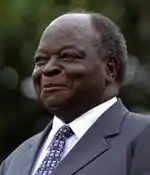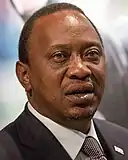2002 Kenyan general election
General elections were held in Kenya on 27 December 2002.[1] Voters elected the President, and members of the National Assembly. They coincided with the 2002 Kenyan local elections.
| |||||||||||||||||||||
| Turnout | 57.2% | ||||||||||||||||||||
|---|---|---|---|---|---|---|---|---|---|---|---|---|---|---|---|---|---|---|---|---|---|
| |||||||||||||||||||||
| |||||||||||||||||||||
.svg.png.webp) |
|---|
| This article is part of a series on the politics and government of Kenya |
|
|
Mwai Kibaki of the National Rainbow Coalition (NARC) was elected, defeating Uhuru Kenyatta of the Kenya African National Union (KANU) and Simeon Nyachae of FORD–People.
Incumbent president Daniel arap Moi was ineligible to pursue a third term due to the two-term limit in the Constitution of Kenya. This was the first truly free general election held in Kenya since independence in 1964; a number of by-elections were held in 1966 before the onset of de facto one-party rule in 1969. The general election saw the end of the long-standing dominance of the KANU, which had governed the country since independence in 1963, including 23 years as the only legal party. The National Rainbow Coalition won a majority in the National Assembly.
Background
Incumbent president Moi was constitutionally barred from running in the 2002 presidential elections. Some of his supporters floated the idea of amending the constitution to allow him to run for a third term, but Moi preferred to retire, choosing Uhuru Kenyatta, the son of Kenya's first President, as his successor.[2] In protest of Moi's decision a group of disappointed KANU presidential aspirants quit KANU and formed the Liberal Democratic Party (LDP).
In preparation for the 2002 elections, Kibaki's Democratic Party affiliated with several other opposition parties, including the LDP and National Alliance Party of Kenya (NAK) to form the National Rainbow Coalition (NARC). On 14 October 2002, at a large opposition rally in Uhuru Park, Nairobi, Kibaki was nominated the NARC opposition alliance presidential candidate after Raila Odinga made the famous declaration, Kibaki Tosha![3]
Results
President
| Candidate | Party | Votes | % |
|---|---|---|---|
| Mwai Kibaki | National Rainbow Coalition | 3,646,277 | 61.3 |
| Uhuru Kenyatta | Kenya African National Union | 1,835,890 | 30.2 |
| Simeon Nyachae | FORD–People | 345,152 | 5.9 |
| James Orengo | Social Democratic Party | 24,524 | 0.4 |
| David Ng'ethe | Chama Cha Uma | 10,061 | 0.1 |
| Invalid/blank votes | 114,006 | – | |
| Total | 5,861,904 | 100 | |
| Registered voters/turnout | 10,451,150 | 57.2 | |
| Source: IFES | |||
National Assembly
| Party | Votes | % | Seats | +/– | Appointees | |
|---|---|---|---|---|---|---|
| National Rainbow Coalition | Liberal Democratic Party | 2,634,173 | 56.1 | 59 | New | 7 |
| Democratic Party | 39 | 0 | ||||
| FORD–Kenya | 21 | +4 | ||||
| National Party of Kenya | 6 | New | ||||
| Kenya African National Union | 1,361,828 | 29.0 | 64 | –43 | 4 | |
| FORD–People | 702,258 | 14.9 | 14 | +11 | 1 | |
| FORD–Asili | 2 | +1 | 0 | |||
| Safina | 2 | –3 | 0 | |||
| Sisi Kwa Sisi | 2 | New | 0 | |||
| Shirikisho Party of Kenya | 1 | 0 | 0 | |||
| Other parties | 0 | – | 0 | |||
| Invalid/blank votes | – | – | – | – | ||
| Total | 4,698,259 | 100 | 210 | 0 | 12 | |
| Registered voters/turnout | 10,498,122 | – | – | – | ||
| Source: Psephos, African Elections Database | ||||||
See also
References
- Kenya: 2002 National Assembly election results EISA
- Marc Lacey (13 October 2002). "Kenya's Leader to Step Down but Not Out". New York Times.
- "The deal and deal makers in Kibaki's 2002 victory". Nation.co.ke. Retrieved 1 June 2010.


